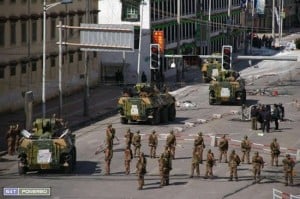
Military patrols in Lhasa following the protests that began on March 10, 2008. The identifying markings of military vehicles believed to belong to the PLA, such as those pictured, have been covered.
The authorities are imposing even tighter restrictions in Lhasa and the Shigatse area to prepare for the Olympic torch relay. Earlier this week, a meeting to mobilize security and other official personnel was held in Shigatse prefecture (Chinese: Rigaze) in connection with the torch route to Mt Chomolungma (Everest), which is in Tingri (Chinese: Dingri) county in Shigatse prefecture. According to reliable reports, a curfew is likely to be imposed in Lhasa when the torch passes through, in addition to the already severe restrictions on movement in the capital.
Chairman of the Tibet Autonomous Region government Jampa Phuntsog said on April 9 at a news conference in Beijing that if there are any “problems” during the Olympic torch relay from Tibetans, “We will without doubt deal with these persons severely…we will not be merciful.”
Non-Chinese international media based in China, who had been approved to report on the attempt to take the torch up Everest were told on Tuesday, the day of their scheduled departure, that the media trip had been postponed and partially cancelled (Reuters, AP, April 22). The Beijing Organising Committee for the Olympics Games (BOCOG) claimed that this was due to “unsuitable weather”.
The situation in Lhasa remains tense, with detentions still occurring and serious concerns for the welfare of monks under lockdown in the monasteries of Sera, Drepung and Ganden. Severe conditions gave been reported in detention centers and prisons. Due to deprivation of water and food, prisoners have been forced to drink their own urine at Gutsa Detention Center in Lhasa and other detention facilities, and many are undergoing severe torture and aggressive interrogation, according to several reliable sources in touch with eyewitnesses.
In one incident following March 14, armed police came to a family home to take away the bodies of three children who had all been shot in the back, for ‘post-mortem’, according to a source in touch with eyewitnesses. The police arrived when families were carrying out traditional religious rituals for the children, and the families were warned that they would go to prison if they did not release the bodies.
China attempts to impose information blackout
China is now resorting to even harsher measures to subdue and silence the Tibetan people, which are having an impact in terms of information reaching the outside world. On an official website, the Lhasa authorities warned today that there would be repercussions for Tibetans who “spread rumors, create disturbances and deceive the public”, as part of the political campaign against “separatists”.
Similar threats and warnings were made elsewhere in Tibet as authorities sought to achieve an information blackout. In Jyekundo (Chinese: Yushu) Tibetan Autonomous Prefecture in Qinghai, armed police raided households and took away components of satellite televisions, according to the Tibetan government in exile. The same report referred to an official circular stating that Tibetans are not allowed to watch news channels and can only watch state-run television channels (April 22, Tibetan government in exile).
In the meantime, reports in the Chinese state-run media sought to convey an impression that the situation in Tibet is “returning to normal” in the runup to the torch relay through Tibet. The first domestic tour group since the crackdown began arrived in Lhasa today, according to a report by Xinhua (April 24). An official working for the tourism authorities was quoted in the report as saying: “Tibet will keep its image as a safe, healthy and civilized tourist destination.” The Chinese authorities have not given an indication of when restrictions on foreign tourists to the Tibet Autonomous Region will be lifted.
A confidential International Olympics Committee memo obtained by the organization Reporters Without Borders refers to demonstrations that might take place as the torch passes through Tibet on what Beijing describes as its ‘Journey of Harmony’. The 26-page IOC memo, marked confidential and sent to national Olympics committees on March 26, stated that the “IOC will not interfere with the actions of local authorities”, and that in the event of an “extreme crisis,” the IOC and BOCOG suggest making no comment or expressing condolences with any victims. (RSF report, April 9)

